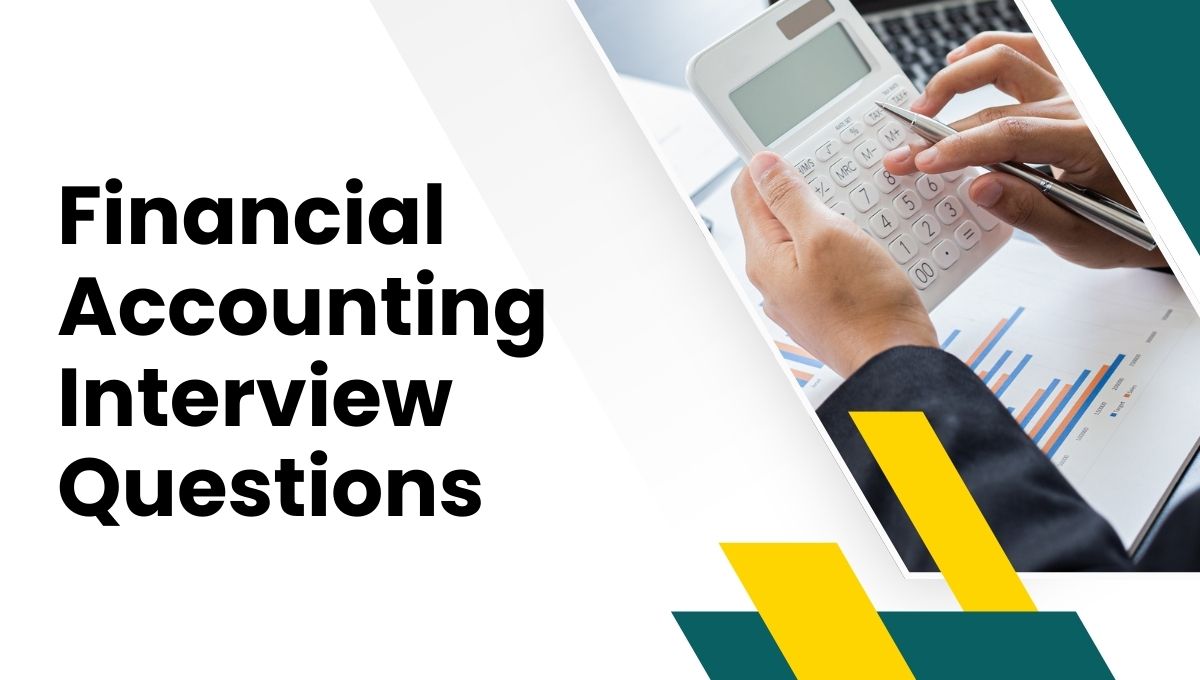Financial Accounting Interview Questions: As per research, the global financial services market was valued at US$33,379.8 billion in 2024, and it’s expected to have a compound annual growth rate of 7.4% so that it rises to US$35,857.46 billion in 2025.”
Also, mastering BCom graduates and their knowledge require mastering the two technical and analytical skills left with the hiring managers or recruiters and mastering the answers to different kinds of interview questions in financial accounting. This is why the companies seek out professionals who will get the financial transactions done properly, maintain books of accounts, and also follow the regulatory norms.
The freshers do come with the kind of confidence which really does help them to find the right kind of job, while answering the BCom interview questions. The guide offers an all-rounded overview of all BCom interview questions on different levels of difficulties.
Having this information of questions, the candidate will have confidence in financial accounting and will not withdraw at any time during the strenuous hiring procedures.
Common Financial Accounting Interview Questions
Standard Financial Accounting Questions
Q1: What is the meaning of financial accounting?
The key principles of financial accounting include accrual accounting, going concern, matching principle, and consistency. In the case study at hand, the financial reports get done correctly, and financial statements speak clearly out.
Q2: Accrual Accounting vs. Cash Accounting.
Accrual accounting will automatically account for the transaction at the time of occurrence. In cash accounting, they only get face-to-face when the money is realized. Most have adopted accrual accounting because appropriateness in giving an exact view on how they are actually doing financially.
Q3: Double-entry bookkeeping.
The double-entry bookkeeping will ensure that every financial transaction will affect at least two accounts. In this, the accounting equation Assets = Liabilities + Equity will be maintained. This will increase the accuracy level in respect to the finances and will not misstate the financial accounts.
Q4: What are the different types of financial statements?
Financial statements consist of:
- Balance Sheet: It tells about the assets, liabilities, and equity.
- Income Statement: It provides information regarding revenue, cost as well as the profit incurred.
- Cash Flow Statement: This one states about cash inflow along with the outflow.
- Statement of Changes in Equity: Explains the changes in equity undertaken by the shareholders.
Intermediate-Level Financial Accounting Questions
Interview Questions for BCom Graduates
Q5: Definition of Depreciation with the formula.
It is the spreading of the cost incurred by an asset over its entire period of its use. Among the three most used, three most followed methods are the following: Straight line, Reducing Balance, and Units of Production are the ones followed the most. Also a requirement for the preparation of financial statement as well as tax audit
Q6: Revenue Expenditure Vs Capital Expenditure.
Revenues Expenses All the costs for running everyday businesses such as, for example, paying for rent or electricity or salaries of employees. Capital Expenditure are investment in the form of a machineries or buildings and that later benefits the firm
Q7 : Define goodwill related to accounts:.
Goodwill refers to that intangible value of the business which is achieved due to brand reputation, customer relation, or intellectual property. In such a case, goodwill is increasing when one buys another at the price other than his net assets.
Q8. What is an adjusting journal entry?
The adjusting journal entries will ensure revenues and expenses are recorded for the right accounting period. Here are some examples of adjusting journal entries for journals.
Few illustrations of accrued expense, prepaid expense, and deferred revenue.
Long Questions on Advanced Financial Accounting Questions
Comprehensive Interview Questions for BCom Students
Q9: Contingent Liabilities and Its Accounting
Contingent Liabilities those liabilities that are reliant on future occurrences. In such a case where such liabilities might become probable as well as capable of being reliably measured, they are included in the financial statement. Outstanding cases and warranty liability are examples of contingent liabilities
Q10: IFRS 15 Revenue accounting
Revenue is accounted for using a 5-step model as follows:
Identify the contracts with customers.
Identify the performance obligations.
Determine the transaction price.
Allocate the transaction price to the performance obligations.
Accrue revenue when and as the obligation is met.
Q11: Accounting adjustment is what relating to and why it’s important.
Accounting adjustments consist of provision for doubtful debts, write-off of inventories, and fair value adjustment. It is important as it gives an accurate and proper position of the finances of an enterprise from accounts.
Q12. What are deferred tax liabilities and assets?
A deferred tax liability arises if payable tax exceeds the tax for the expenses incurred. Conversely, if paid tax exceeds expense tax then there would arise a deferred tax asset. The situations thus obtained arise as outcomes of variance and deviation between timing and accounting base as well as between tax accounting bases. Why do one require enrolling oneself into the course Finance Accounting? Finance Accounting and Management – Master degree
A Financial Accounting program will make BCom graduates even more skill-intensive. Practical exposure from day one and career advancement opportunities will be given.
- 100% Job Guarantee for freshers with 0-3 years of experience
- Weekdays: Classroom Sessions (3 months) | Weekends: Hybrid (6 months)
- 7 Guaranteed Interviews with 1000+ hiring partners
- 60% Salary Hike on completion
- Comprehensive hands-on training with industry-relevant tools
- Real-world case studies and project-based learning
- Mock interviews and soft skills training for preparedness
Financial Accounting Interview Questions FAQ
- What are the general financial accounting interview questions?
These questions are based on general principles, financial statements, depreciation, revenue recognition, and taxation.
- How to prepare for a financial accounting interview?
You can prepare to be well-equipped by practicing the technical questions and getting a good grip on accounting principles and enroll for a Financial Accounting course that may make your interview effective enough
- The levels of difficulty of the financial accounting interview questions vary with experience and the type of job, and some of the entry-level ones include even the basic ones. Advanced ones require information in depth about the financial reporting standards or tax regulations.
- Do finance accounting courses prepare for an interview?
YES; the technical course will give the student hands-on experience through on- the-job training and industry -wise skills that increase employability in the marketplace.
- What are Red Flags in Financial Statements?
Inappropriate recognition of revenue: a surge may indicate unorthodox bookkeeping
High debts: High liabilities compared to the assets
Changes in restatement: Modifications in the accounting statement indicate mis- application of accounts
Too many dissimilarities without interpretation are called bad books
Conclusion
Accounting interview questions are of great importance to the BCom aspirants of the accountancy career. The present time, being governed by financial rules, keeps on changing and updating itself. So companies ask for employees well-equipped with accounting knowledge and logical reasoning. This makes candidates appear in the interview round and get easy appointment with acceptable compensations in terms of applying technical principles on actual ground.
It is a course like financial accounting that would come only when it gives that kind of skills, ability toward employability, systematic approach toward practical work, and job support at the training stage.
Boost your career now. Come and enroll into the Postgraduate Financial Accounting and Management Course today. For sure, get placed into a good paying job!


